Healing Minds Foundation’s Growth
Broad objective of the project
The success of trauma helplines has been well-documented globally. After extensive research we recognised that there are two main problems facing those who have been psychologically damaged by the seemingly intractable violence in Kashmir. The first is the profound social stigma in Kashmir attached to going to a psychiatric hospital or clinic. For example, if a young village woman is known to have been to a psychiatric clinic it will be seen as a stain on her personality, and her marriage chances, regardless of how temporary her psychological problem may be. A helpline staffed by highly trained listeners addresses this problem because it offers anonymity and total confidentiality. This is particularly powerful in a society where it is hard for people to be able to speak in private about the emotional and mental problems that they are facing.
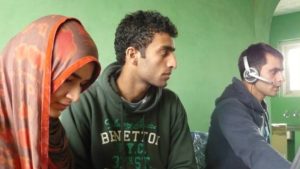
Kashmir LifeLine listening staff during training. Photo © Barbara Krieger
This project is also targeting a sector of Kashmiri youth that feels disenfranchised and disempowered by the situation in the state. One of the fundamental issues is that these young people do not feel that they are being heard, and therefore, in some cases, they resort to violence, as has been witnessed during intense periods of civil unrest in Kashmir in recent years. A helpline that allows callers to talk, and that guides them towards examining their frustrations and fears, has been proven one of the most effective ways of breaking through to this youth sector. We continue to adapt to each new situation in the region, from natural disaster to heavy curfew and heightened security threats with a balance of preventative and curative models. The preventative programmes introduce young and adolescent students to skill sets that will allow them to manage the anxiety and fear around external events and life transitions. Meanwhile we continue to provide community-based in person and teletherapeutic support and treatment to those struggling with psychological issues and stressors.
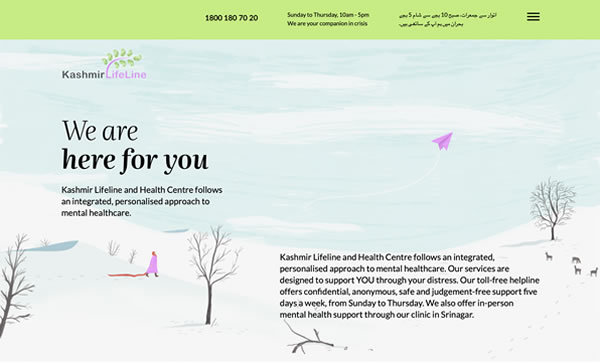
The homepage for Kashmir LifeLine. http://kashmirlifeline.org Designed by Karen Menezes
As a tool of referral the helpline offers this network to callers. Information about medical and mental health facilities is very limited in Kashmir. We have created a system of Social Resource Mapping (SRM) that collates information on hospitals, clinics, primary health centres, de-addiction centres, NGOs and their services, and other support organisations. Our team of listeners has been trained to use this referral system when speaking to callers. As a part of the Social Resource Mapping we continue to do liaison work with those on the list in order to keep information up to date, and to check that referrals are being seen, and treated.
We are very conscious of the fact that the ‘burn-out’ rate amongst mental health workers in Kashmir is high. We have put a premium on training our staff to understand how the work impacts them personally. We have trained them in methods of self-awareness, self-analysis, and physical and mental relaxation techniques. All of our senior staff are already experienced counselors, with a minimum of two years work in the field in Kashmir.
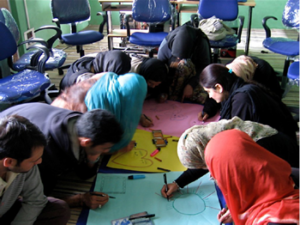
Using art as one method of self-analysis for listeners
The second major problem is the one of time, or rather the lack of it. A patient has roughly two or three minutes with a psychiatrist in an out patients’ clinic. This only allows time to prescribe medication at high speed. The pressure on doctors and psychiatrists is enormous, and they have no option but to work this way. Our mental health centre works on an appointment basis that allows a minimum of an hour per patient, offering a combination of counseling, mental trauma therapy, and medication advice.
Our helpline office and mental health centre opened in January 2011. We ran the first training course for our listeners in January and February 2011, and we now have a very impressive and motivated team of young Kashmiri men and women, trained to be both listeners and counselors. In addition to this we have a management team in place, headed by our senior doctor. Our centre is located within the Civil Lines area of Srinagar, so that it can still be accessed, even during full curfews in the city. It is also close to a main bus stand so that it is easy for patients and staff to reach. We have chosen a quiet area so that it is a peaceful and unthreatening environment for both our staff, and for patients coming to the centre, particularly those from village and rural areas who are not used to the chaos of the city.
To sum up, as we grow, we ‘return to the roots’, working ever more closely with in local settings. It takes a lot for people to feel safe enough to come for therapy and recovery treatment in a society in which admitting to mental health issues remains heavily stigmatised, and those who seek help have often be mentally bruised by an already overloaded system. It is as though we are working in two directions at the same time, moving deeper into communities as we expand.
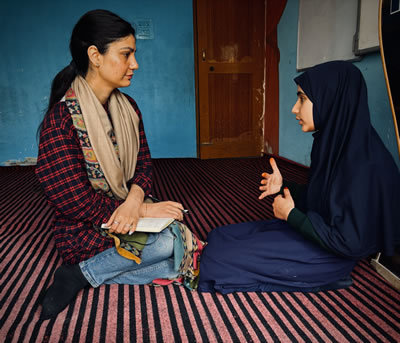
Mentor-menteeship: A member of the team with one of the young volunteer leaders of our Young Minds Programme.
We have also been running mental health awareness programmes in schools, colleges and with government health and social services agencies. In addition we have recently launched a weekly radio programme, a question and answer series on one of the most popular stations. This is because it is hard to reach women, except through the female primary health care worker system, or via popular radio. The idea is that listeners get involved in the programme, and learn about mental health at the same time. Radio is a better option than television because the power goes out so often that radio has a higher listenership than television viewing figures.
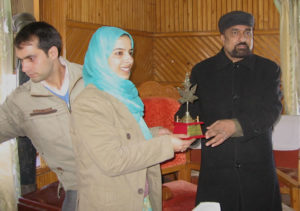
Two of our senior team, Fairoz and Nazia Ronga, receiving a government award for the work of Kashmir Lifeline in the region.
We are growing due to the work of our team in Kashmir and our boards in India and the UK. We continue to develop models that give back agency to those we work with, enabling them to return to their lives within their families, communities and working lives. Beyond this we strive to draw the communities into our work, creating partnerships with schools, colleges, local business, religious communities, and other NGOs.
Healing Minds Foundation continues to foster internship relationships with universities in India and beyond. We have had multiple internship programmes with Tufts University (Boston, USA), Wilson College (Mumbai, India), Ashoka University (Delhi, India), Sai University (Chennai, India), and The Oslo Freedom Forum Scholars Programme.
We are fortunate to work closely with the two main mental health settings in the Kashmir Valley, the Kashmir Institute of Mental Health and Neuroscience, and SMHS Hospital Srinagar, with the support and guidance of Dr Arshad Hussain and Dr Yasir Rather.
Due to the restrictions around NGO funding in India we are extremely grateful now to be fully funded by Mariwala Health Initiative. We remain indebted to our seed and development private funders who made this work possible, and we look forward to being to reaching out for support in the US again with Mariwala Health Initiative. For more information about funding please contact: info@justinehardy.com
Healing Minds Foundation also currently has under-graduate and post-graduate internship programmes running with Tufts University (Boston, USA), Sarah Lawrence College (New York), Wilson College (Mumbai), and The Oslo Freedom Forum’s Oslo Scholars Programme
To date the project has been made possible due to the support, work, advice and energy of the following people: Malik Sajad, illustrator and cartoonist, who designed and created our website in conjunction with Barbara and Imobisoft, Srinagar, Dr Arshad Hussain – senior psychiatrist, Srinagar, and one of our advisors, And we are all grateful to the generosity and warmth of our private donors:
- Richard I. Morris Jnr
- The Irfan Kathwari Foundation
- Jean Clack, who came many times to train the team, enabling us to add Reiki to our somatic treatments
- Mary and Garrett Moran
- Mary and Peter Lloyd
- Beth Floor
- Kate and Denzil How
- Mike Foster
- Louise Grimes
- Ariane Lang and her yoga students
- Steve Cohen and Andréa MacLeod
- Tracey Jackson
Our particular thanks go to Richard I. Morris Jnr and Barbara Krieger without whom this organisation’s work would not have been possible.
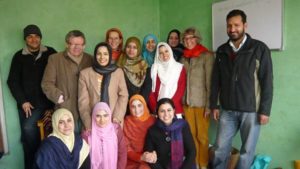
Richard and Barbara, second from left, and second from right, with the team
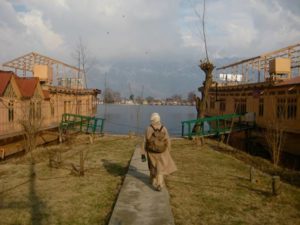
At the end of the day. Photo © Jonathan Foreman
Copyright © 2011 and 2012 Justine Hardy
info@www.justinehardy.com
